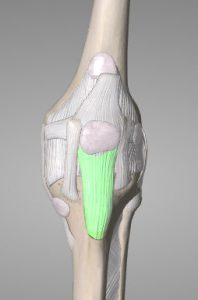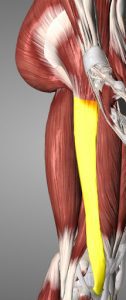by Rachel Varga
INTRODUCTION
Running is an extremely popular sport, whether it is done competitively or recreationally, and as an individual or group activity. One of the biggest barriers to a runner is pain, which can occur in many ways. A very popular place pain will show up in a runner is the knee. This can create issues for someone attempting to start, maintain, or progress their running program.
Are you a runner with knee pain?
Keep reading to learn more about possible mechanisms behind it, as well as some of the things a physiotherapist specializing in running injuries would consider in order to overcome it!
KNEE PAIN CONDITIONS
There are many reasons why someone might develop knee pain when running, and often it is simply classified as ‘Runner’s Knee,’ but what does that really mean? Well, as the name suggests, ‘Runner’s Knee’ is just a phrase used to describe knee pain – in runners! To be clear, this is not a true diagnosis, and there could be many other conditions that explain the pain from running.
It’s our job as fellow runners and physiotherapists, like myself, to find out exactly what is going on, and most importantly, why!
Some of the most common conditions that can affect the knee in runners include:
 Patellofemoral Pain Syndrome
Patellofemoral Pain Syndrome
Patellofemoral Pain Syndrome (PFPS) is what is probably most commonly referred to as that “Runner’s Knee,” as previously discussed. This is because it is also an umbrella term used to describe pain that can be located on top, slightly above, or slightly below the kneecap, and is undoubtedly brought on by running.
Given that it is such a broad definition, there are many factors that might lead to its occurrence. This may include muscle weakness, tight muscles, joint irritation, patella maltracking, or co-existing problems in the hips or ankles.
With so much to consider for a diagnosis such as PFPS, it is important to take a holistic approach to its assessment and treatment to prevent future complications.
 Patellar Tendonitis
Patellar Tendonitis
The Patellar Tendon is located just below the kneecap (patella). It attaches from the bottom of the patella to the top of the shin bone and its major function is to transmit the force of the quadriceps over the knee joint.
When there is increased load on the knee extensors, such as during running, or any other activity that requires an explosive contraction of these muscles, it can overload the patellar tendon. This in turn can result in damage to the tendon fibres, with associated knee pain and inflammation.
In the beginning, tendon injury may be minor. However, if load is continuously applied to the patellar tendon that exceeds its healing capacity, chronic pain and dysfunction can result.
 Iliotibial Band Syndrome
Iliotibial Band Syndrome
The Iliotibial Band (IT Band) is a thick band of connective tissue that comes from the Tensor Fascia Latae (TFL) and Gluteus Maximus muscles. It originates from the anterior iliac crest of the pelvis and attaches on the lateral aspect of the knee at the lateral epicondyle. As it travels along the outside of the thigh it crosses both the hip and knee joints.
IT Band Syndrome is a repetitive overuse injury of the knee that commonly occurs with running or even excessive walking. During these activities, as the knee flexes and extends, the IT Band moves backwards and forwards repeatedly over a bony structure called the lateral femoral epicondyle of the knee joint. If there is excessive friction of the IT Band over this area, it can lead to inflammation. The most common symptom is pain localized to the lateral aspect of the knee.
If left ignored, IT Band Syndrome can lead to progressive knee pain or recurrent inflammation.
Other Reasons for Knee Pain
Although these are some of the most common diagnoses, there are also many other possible explanations for knee pain when running. Other potential conditions include:
- Ligament or meniscus injury
- Osteoarthritis
- Bursitis
- Patella subluxation
SYMPTOMS
While running may be the most significant trigger behind any type of knee pain, other aggravating positions or movements that might be experienced should also be considered. This could involve:
- Pain going up or down stairs
- Pain with squatting
- Pain when kneeling
- Pain when sitting or standing for prolonged periods of time
- Pain with transitional movements
In addition to the knee pain itself, other symptoms that might be noticeable are swelling, stiffness, clicking, grinding, and pain in different parts of the lower extremity, such as the low back, hips, ankles or feet.
POTENTIAL CAUSES
There are often several contributing factors behind any knee pain diagnosis from running. These can include, but are not limited to:
- Previous knee trauma
- Overuse from other sport or activity
- Increased running mileage
- Increased running speed
- Running surface
- Footwear
- Muscle imbalances
- Joint abnormalities
In many situations, pain in the knee may not even be originating from the knee itself. Referred pain to the knee when running can come from the low back, hips or ankles.
CONCLUSION
There are many reasons why someone chooses to take up running. It could be to increase cardiovascular fitness, build strength, maintain a healthy weight or improve mental health. Therefore, whether you are a year-round or seasonal runner, or completely new to the activity, experiencing knee pain can be extremely hindering and discouraging to achieving whatever those goals might be.
A physiotherapist who specializes in running can help by conducting a thorough assessment to ensure a proper diagnosis is obtained. This would involve taking a detailed health and running history, examining the area of interest, and performing a series of specific tests. Then, an individualized treatment plan and return to running protocol would be developed to help achieve your goals.
If you are experiencing knee pain while running and could benefit from a physiotherapy assessment, book an appointment with Registered Physiotherapist and resident running specialist, Rachel Varga, at Synergy East, today!
You can call us to book a consultation at (416) 551-8715, or simply book online.

Rachel Varga
Physiotherapist - B.A. Hons (Kin), MSc.PT
Rachel Varga is a physiotherapist practicing at Synergy Sports Medicine, East End (2017 Danforth Avenue)


 Patellofemoral Pain Syndrome
Patellofemoral Pain Syndrome Patellar Tendonitis
Patellar Tendonitis Iliotibial Band Syndrome
Iliotibial Band Syndrome